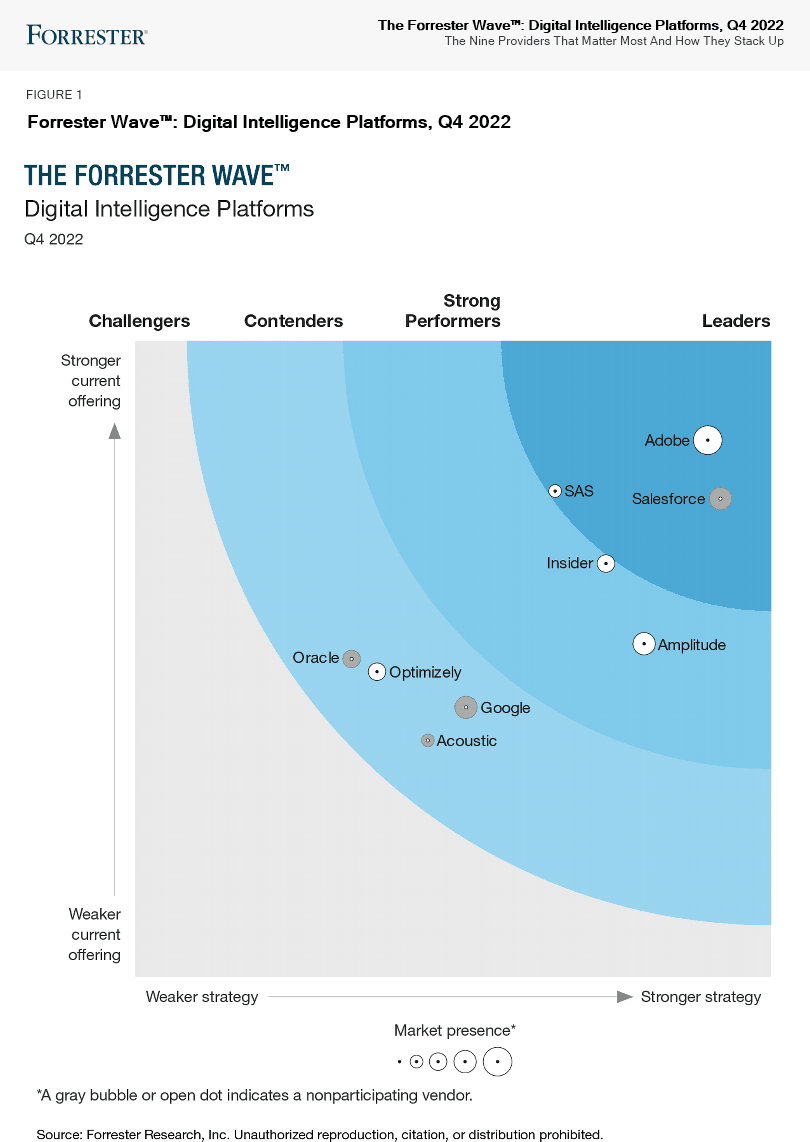Amplitude vs GA4 Webinar Recap: The Need to Know Insights in 4 Minutes
Discover the differences between Amplitude and GA4 with our webinar recap.
As most of you will know, GA Universal is soon to be sunset, and its successor, GA4, has received mixed reactions. This webinar wades in to take a close look at both the features and usability of both products. Our product evangelist and analytics veteran Adam Greco hosted a deep dive webinar into the differences between GA and Amplitude with a close side-by-side comparison of the two platforms. Here’s a round-up of the topics discussed. We will not aim to capture the depth and detail of the webinar but instead cover the main talking points and highlights.
Analyst Reviews
GA is a major player in digital analytics, but industry reviews and ratings tell a different story. Forrester’s recent review found Amplitude to have a stronger and more strategic offering. End-user ratings on G2 Crowd, especially for product analytics, consistently rate Amplitude as the highest vendor. GA is not even rated in this area due to its focus on marketing analytics.

Reporting Interface
One of the nice things about the GA4 reporting interface is that it does a lot right out of the box. But, they have limited customization options, with a clunky and difficult-to-learn customer interface. Users may find it challenging to understand the scoping required for reporting, which could hinder self-service analytics adoption. There are also restrictions on metrics, dimensions, segments, and data breakdowns. Many users turn to BigQuery or Looker for more flexibility, but it could be costly and out of reach for some. Amplitude offers a more user-friendly reporting interface with event segmentation, data tables, forecasting, anomaly detection, and root cause analysis features.
Storytelling & Collaboration
In GA4, data, storytelling, and collaboration options are limited, making it difficult to add context to dashboards. Amplitude offers collaboration features like Spaces, Dashboard Templates, and Notebook for data storytelling and contextual conversations. Public links and integrations with tools like Slack, Notion, and Miro enable easy sharing of reports and dashboards. These features help users share data and insights with their colleagues for successful digital analytics.
Acquisition
Understanding where visitors to your digital products come from is critical to marketers. GA4 has seamless integration with Google Ads but not with other advertising networks. It only allows one channel view, unlike GA Universal. Amplitude has a classifier table for creating custom channels and API integrations with Facebook and Google to combine advertising and product metrics. It also pulls campaign metadata and allows users to analyze metrics by metadata.
Attribution
GA4 has limitations on attribution modeling and retention reporting, including a 90-day look-back window and a single attribution model for the entire project. Amplitude offers multiple attribution models and customizable retention reports with no limitations on look back window or the number of segments that can be applied. Additionally, Amplitude allows attribution on any property, not just acquisition channels.
Conversion Funnels
Conversion funnels are a powerful tool in analytics that can help businesses understand user behavior and optimize their websites or products for better conversion rates. While GA4 offers improvements over its Universal predecessor, its segmentation capabilities are limited to only four segments per funnel. Amplitude’s conversion funnel offers advanced features such as user journeys, individual user paths, and conversion drivers that use machine learning to determine which events cause users to convert. Amplitude also offers the ability to hold certain properties constant throughout the funnel, allowing businesses to analyze the impact of specific variables on the conversion rate. Furthermore, the funnel provides a histogram view of the time to convert, enabling users to see how long it takes users to move through different funnel stages.
Third-party Integration
Regarding third-party integrations, Google Analytics 4 has strong integrations with the Google Marketing Cloud and some with Salesforce Marketing Cloud, but may struggle to integrate with other platforms. Its audience feature is dependent on the use of Google Signals, can be problematic in terms of GDPR compliance. Amplitude takes an open approach, allowing users to import or export data and cohorts of users easily. They offer pre-built integrations with hundreds of vendors that can be set up quickly, and their native experimentation product, Amplitude Experiment, is fully integrated into their analytics platform. Additionally, Amplitude offers user-profiles and event streams for every user, which stitches together their behavior across different devices, allowing for more comprehensive analysis and personalization.
Data Governance
Data governance is critical to success in digital analytics, but it’s often overlooked. Amplitude offers features like object officiation, preventing the creation of duplicate metrics, and documentation of where events and properties are being used. Unlike GA4, Amplitude allows data to be edited and transformed without changing the underlying data. It also offers to drop and block filters to hide or permanently delete bad data. These features make it easier to clean up implementation, group data, and ensure accuracy in data analysis.
Customer Success & Support
Customer success and support are crucial when choosing a digital analytics vendor, as the relationship can last for years. GA4 customers understand that they will only have a direct support relationship with GA if they are one of the highest-paying customers. You will likely be going through an agency or a consulting firm. Amplitude prioritizes customer support and offers dedicated resources to paying customers, even providing on-demand training and community forums for free users.
Migrating to Amplitude
The migration process from GA to Amplitude is easy. The free version of Amplitude is available for users to try, although there are limits on the number of events that can be captured. For those using Google Tag Manager (GTM) for websites, Amplitude has created two free templates, one client-side and one server-side, to leverage the data layer and work already done in GTM. Amplitude also integrates with BigQuery to backfill as much data as needed. For those still using GA Universal, there is a tool to download information about the taxonomy to Google Sheets from Universal and set up the taxonomy in Amplitude through APIs.
Google Analytics has been a dominant force in digital analytics for many years, but with the move to GA4, it may be time to consider alternative solutions. For the full in-depth comparison and insights, watch the full webinar recording.
Watch the full recording here

Lucy Harwood
Former EMEA Content Marketing Manager, Amplitude
Lucy Harwood is formerly a Content Marketing Manager at Amplitude, focusing on topics that speak to the EMEA region. Lucy graduated from the University of Amsterdam with an MA in Communication & Information, focusing on argumentation in science, health, and politics.
More from Lucy





